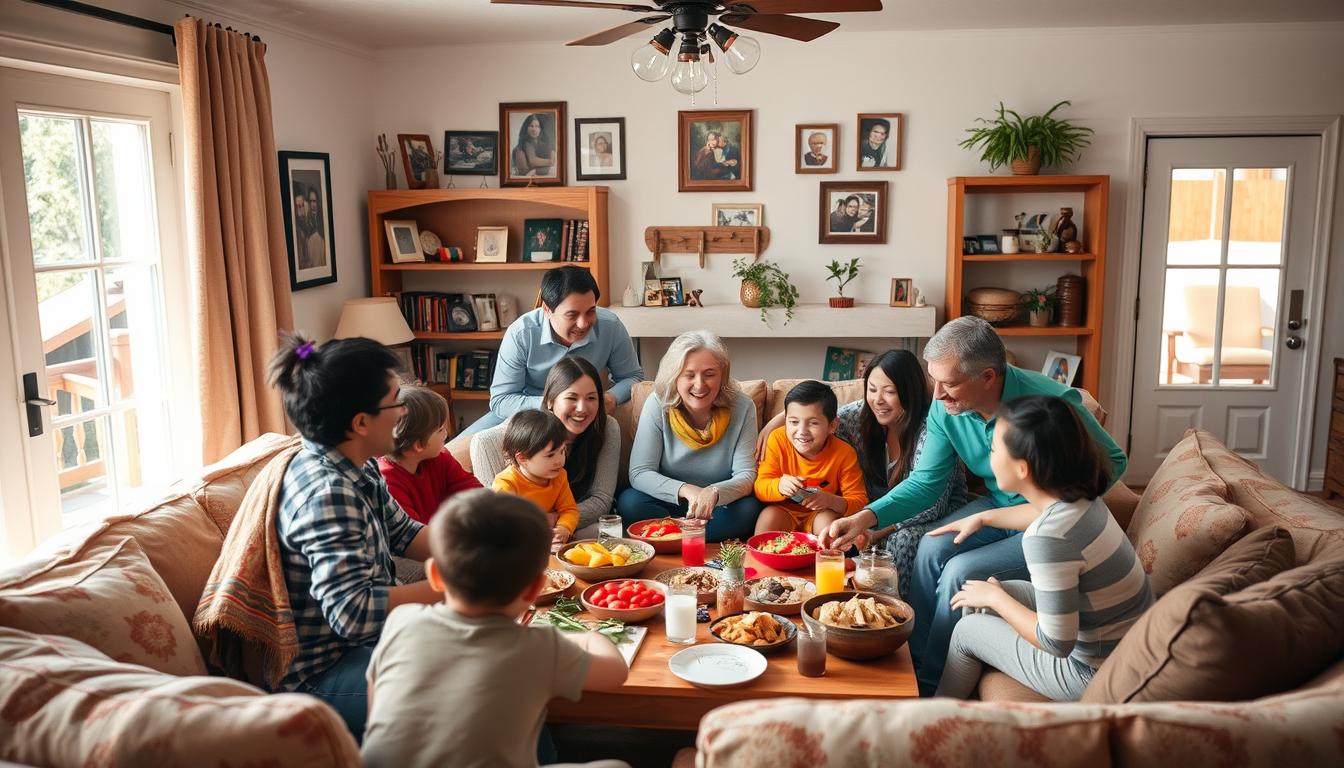Family and friendships form the framework of our lives, providing support, joy, and companionship. In the digital era, technology has been a double-edged sword; while 70% of respondents believe it has simplified staying in touch, creating genuine connections requires more than just typing a message or making a call1. Statistics show that 85% of individuals find regular communication through various digital platforms essential to strengthen family bonds and improve friendships1. However, to enhance personal relationships, we must look beyond the screen and embrace the power of active listening, reciprocal support, and celebrating milestones together12.
To navigate the balance between convenience and connection, it’s crucial to foster relationships with intention and mindfulness. Embracing concepts put forward by MHF Young Leaders, such as respect, honesty, and trust can lay a strong foundation for any relationship2. We must remember that while digital tools like Google Calendar can keep us informed about important dates, it’s the personal touch—perhaps, a phone call or handwritten note on a birthday—that truly deepens the bond 75% of people agreed on1.
Key Takeaways
- Embrace technology as a tool, not a replacement, for nurturing relationships1.
- Invest time in active listening to truly understand loved ones1.
- Maintain traditions and celebrate milestones to enhance the sense of belonging1.
- Utilize practical gestures of appreciation to show care and strengthen connections1.
- Ensure open, respectful communication to maintain healthy, honest relationships2.
- Acknowledge emotions and set boundaries to foster well-being in personal relationships2.
Understanding the Importance of Family Bonds
The central role of family in personal development and societal welfare cannot be overstated. It’s within the family framework that individuals often experience their first and most significant emotional, social, and support systems.
The Role of Family Relationships in Personal Well-being
Family relationships sit at the heart of our emotional and psychological landscape. Studies show that adolescents who regularly engage in family dinners exhibit not only better academic achievements but also higher self-esteem and stronger resilience from family3. These shared moments contribute significantly to an adolescent’s sense of belonging and stability, enhancing their overall family wellbeing. Furthermore, positive interactions within the family unit are linked to a lower propensity for risky behaviors and mental health issues in teens3.
The Impact of Strong Family Ties on Resilience and Confidence
Maintaining strong family bonds is crucial for building resilience and nurturing confidence amongst family members. Family interactions, such as playing video games together or participating in game nights, are shown not only to bolster family ties but also promote mutual understanding and respect3. Additionally, the act of engaging other families provides a broader perspective and insight into how diverse family dynamics operate and overcome challenges3.
Communication within a strong family unit relies heavily on open dialogues where individuals feel heard and respected4. The use of ‘I’ messages and encouraging each family member to express thoughts and feelings without judgment plays a pivotal role in fostering a supportive atmosphere4.
Ultimately, it is through the concerted efforts of each family member, committing to shared experiences and consistent communication, that the fabric of strong, resilient, and confident family relationships is woven. This nurturing environment crucially influences personal well-being and the effective building of one’s identity, underscoring the central role of family in our lives.
Effective Communication: The Heart of Lasting Relationships
At the core of building strong relationships within families is the practice of effective communication. It’s the conduit through which members express their feelings, share their thoughts, and foster deeper understanding among each other. Remarkably, effective communication goes beyond merely exchanging information; it involves a keen perception of emotions and intentions which are essential for nurturing lasting bonds5.
To enhance positive communication, families can develop active listening skills, which are fundamental in understanding not just the words being spoken but also the emotions behind them5. This includes recognizing the importance of nonverbal signals, such as body language and facial expressions, which can significantly affect the tone and success of conversations5.
Embracing positive communication and active listening can help resolve conflicts and build strong relationships by offering each person a platform to be heard and understood. Regularly engaging in open and respectful discussions contributes to a harmonious family environment6.
Common barriers to this include stress, distraction, and inconsistent body language, which can lead to misunderstandings and conflicts5. However, these obstacles can be mitigated by maintaining open body language, matching verbal messages with physical cues to ensure clarity, and always adjusting communication strategies in response to the context5.
A simple yet effective method to strengthen communication is through routine family activities like shared meals, which not only improve relations but also offer opportunities for casual and open dialogue6. Additionally, involving children in decision-making processes can enhance their sense of belonging and responsibility, further solidifying the family unit6.
Lastly, valuing each family member’s unique abilities and contributions by acknowledging their differences and talents can significantly foster an atmosphere of respect and appreciation, which is pivotal for thriving family dynamics6.


| Strategy | Benefits |
|---|---|
| Active Listening | Improves understanding and emotional connectivity. |
| Positive Nonverbal Communication | Enhances clarity and effectiveness of verbal communication. |
| Regular Family Meetings | Strengthens bonds through systematic conflict resolution and collaborative decision-making. |
| Valuing Individual Contributions | Encourages respect and appreciation, promoting a supportive family environment. |
Through the strategies listed above, families can cultivate an environment where positive communication and active listening are at the forefront, paving the way for strong relationships that withstand the test of time.
Creating Shared Experiences to Strengthen Bonds
Nurturing family bonds through shared goals and celebrating family traditions can profoundly impact emotional connections within families. Focusing on fun family activities not only brings laughter and joy but also strengthens relationships and fosters a sense of unity.
Developing Family Traditions and Shared Goals
Central to nurturing lasting bonds, family traditions form the backbone of shared memories. Establishing these traditions, from annual family reunions to weekly movie nights, encourages feelings of belongingness and identity within the family framework. Studies have highlighted the significance of these shared moments in promoting mental well-being and social connections7.
In addition to traditions, setting shared goals, such as saving for a family vacation or working together on a home improvement project, can significantly enhance cooperative spirit and mutual respect among family members8. Achieving these goals together not only brings a sense of collective triumph but also cements a foundation of trust and collaboration8.
Incorporating Fun and Novel Activities into Family Life
Introducing new and engaging activities into family routines can break the monotony and spice up the ordinary. Whether it’s planning a nature hike, trying a new craft, or cooking a novel recipe together, these activities promote creativity and can lead to unexpected and memorable moments.


Nearly 82% of individuals in a study reported that engaging in activities like game nights and family outings greatly strengthens familial ties and instills a sense of shared adventure8. Such activities not only provide fun and relaxation but also offer opportunities for learning and growth.
Here are some ideas for fun family activities that can help in strengthening bonds:
- Board game tournaments that challenge the mind and stir competition in a friendly manner.
- Outdoor adventures such as camping, which combines fun with learning survival skills and teamwork.
- Arts and crafts sessions where each family member can express their creativity while working on a collective project.
Organizing these activities encourages communication and strengthens relationships through shared experiences and achievements, creating lasting memories and a closer familial bond9.
By embracing both time-honored traditions and new adventures, families can build a resilient and enriching environment, fostering deeper connections and joyful living7.
Fostering Connection with Long-Distance Family Members
In today’s global village, long-distance relationships within families have become a common reality. With the help of both classic and modern technology, individuals can bridge the gap caused by miles to maintain a loving connection with family members10. A weekly video call schedule via FaceTime, for example, can mimic the routine and regularity of in-person meetings, establishing a rhythm essential for siblings and cousins to stay connected despite physical distance10. Regular communication fosters a foundation of support and strength, deemed crucial by approximately 85% of individuals for their overall well-being11. Such interactions go a long way in enhancing feelings of togetherness, vital for a family’s unity and emotional health11.
Creating a family book club or synchronizing movie nights through platforms like Teleparty are not only enjoyable but are also meaningful ways to share experiences and foster engagement across distances10. These shared activities can establish traditions, values, and common goals, strengthening the bonds of the family unit and providing a sense of belonging and collective purpose11. In addition to digital connections, sending creative snail mail can add a tangible element to communication, especially for younger members of the family without access to digital devices10.
Engagement in mutual activities, even when physically apart, can include things like coordinating family fitness challenges or sharing laughter over texted emoji riddles, which are effective stress busters and bonding opportunities1011. These interactions not only keep the spirit of camaraderie alive, but also ensure that every person within the family structure feels included and valued, even when they are not physically present11. By weaving together a tapestry of conversations, traditions, and shared joys, families can triumph over the challenges of distance and keep their connections as vibrant and fulfilling as ever.
FAQ
How can I strengthen my family bonds?
What role do family relationships play in personal well-being?
How can active listening contribute to stronger relationships?
Why are shared goals important in family relationships?
What are some fun family activities that can help us grow closer?
How can we maintain strong bonds with family members who live far away?
Can external resources like Employee Assistance Programs (EAP) help with family relationship issues?
How can I build resilience and confidence through family relationships?
Source Links
- 7 Simple Ways to Improve Relationships with Friends and Family – My Present Outlook On Life – https://presentoutlook.com/improve-relationships-with-friends-and-family/
- Top tips on building and maintaining healthy relationships – https://www.mentalhealth.org.uk/our-work/public-engagement/healthy-relationships/top-tips-building-and-maintaining-healthy-relationships
- 8 Ways to Strengthen Family Bonds and Improve Family Relationships – https://anchorlighttherapy.com/strengthen-family-bonds/
- Buildling Strong Family Relationships | Cooperative Extension | University of Delaware – https://www.udel.edu/academics/colleges/canr/cooperative-extension/fact-sheets/building-strong-family-relationships/
- Effective Communication: Improving Your Interpersonal Skills – https://www.helpguide.org/relationships/communication/effective-communication
- Positive relationships for families: how to build them – https://raisingchildren.net.au/grown-ups/family-life/routines-rituals-relationships/good-family-relationships
- 022 – The Power of Shared Experiences – Calibrate360 – https://calibrate360.com/power-of-shared-experiences/
- How Shared Experiences Strengthen Bonds at Work and Beyond – https://www.newyou-learning.com/blog/shared-experiences-deeper-relationships
- Bonding with Experiences: The Importance of Growing Closer with Your Family | Rice Psychology – https://ricepsychology.com/blog/relationships/bonding-with-experiences-the-importance-of-growing-closer-with-your-family/
- How to Keep Siblings (or Cousins) Connected When They’re Miles Apart – https://theeverymom.com/how-to-keep-kids-connected-while-apart/
- Strengthen Family Relationships | Homeland Security – https://www.dhs.gov/employee-resources/news/2022/09/20/strengthen-family-relationships



